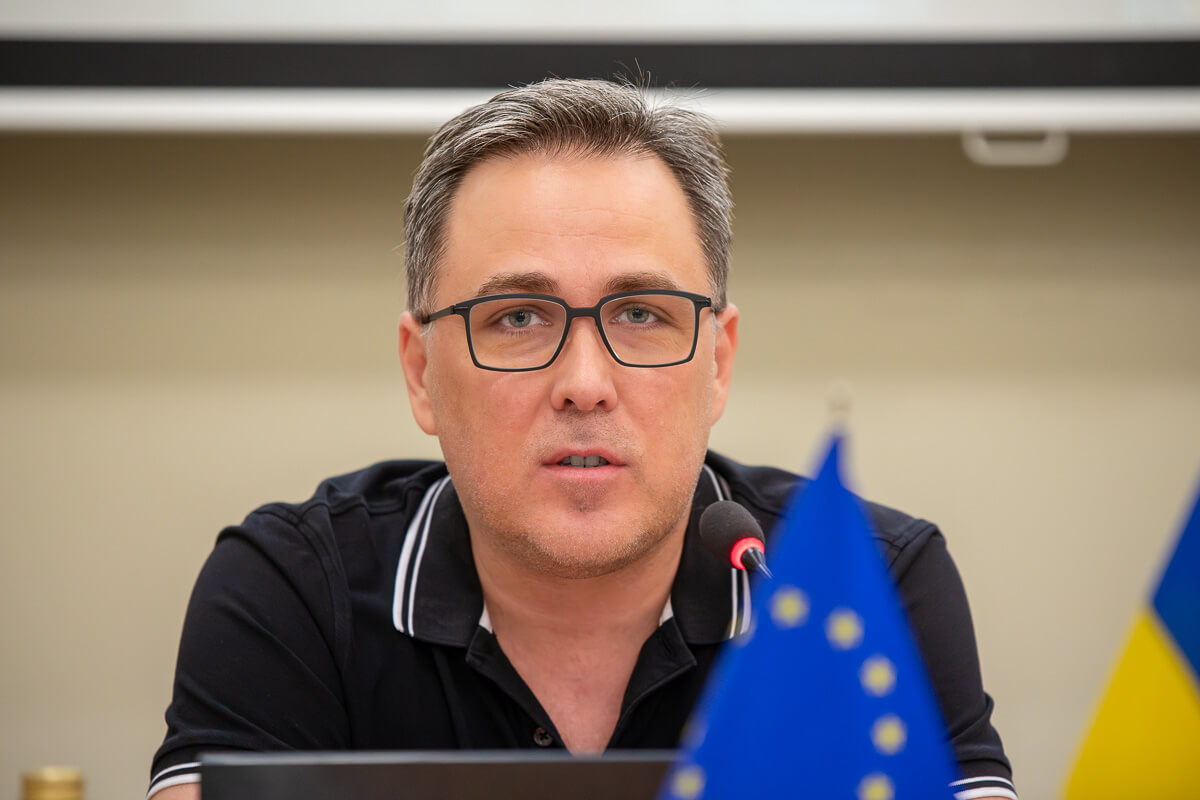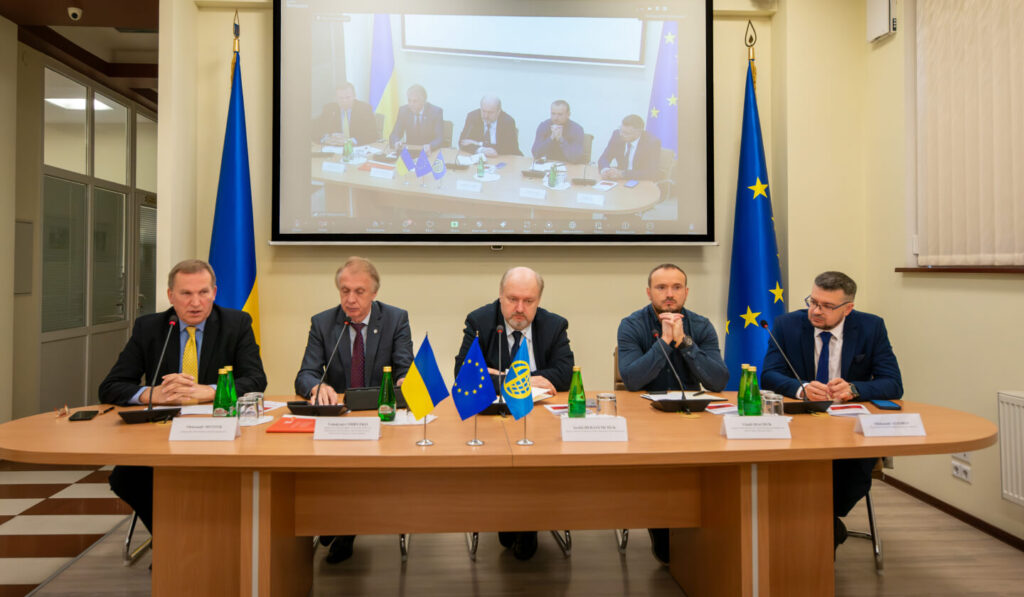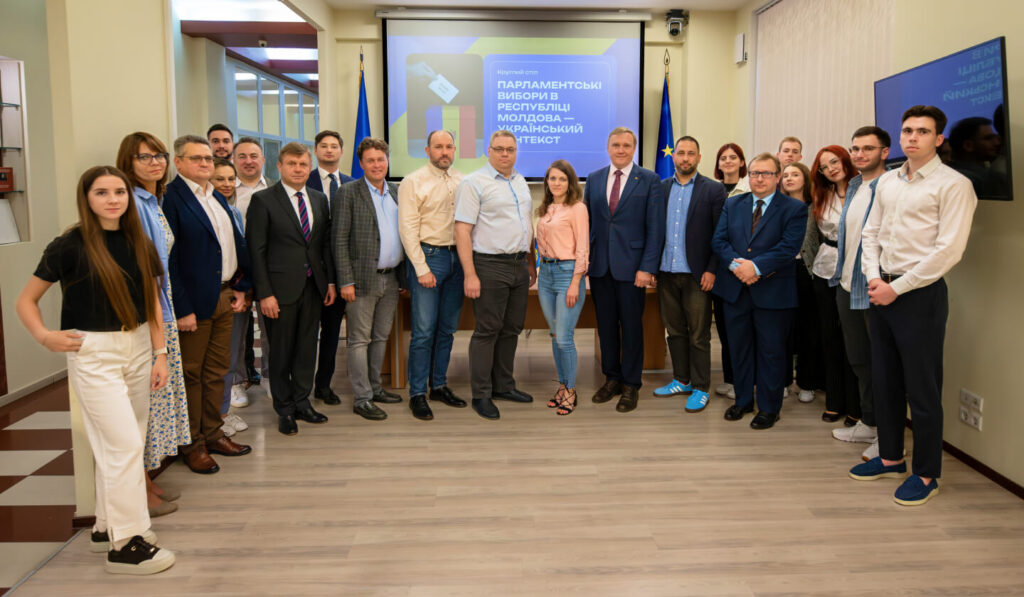On Tuesday, 23 September 2025, the Foreign Policy Research Institute, with the assistance of the Directorate-General for Rendering Services to Diplomatic Missions, held a roundtable discussion entitled Security Guarantees for Ukraine in the Context of a New World Order at the Media Center Directorate of the GDIP.
Hryhorii Perepelytsia, Director of the Foreign Policy Research Institute, Professor of the Department of International Relations and Foreign Policy of Taras Shevchenko National University of Kyiv, Doctor of Political Science, moderated the event. In his opening remarks, Professor Perepelytsia outlined the key issues for discussion and presented his vision of the situation. He particularly emphasised the question of security guarantees for Ukraine amid the risks of a Third World War and the evolving concept of victory:
‘In the early years of the full-scale invasion, we believed in victory until the war itself turned global. A thesis emerged that Ukraine’s victory became impossible once the russian-Ukrainian war acquired the features of a Third World War. This has reshaped the very meaning of victory, where the country’s survival constitutes victory. Thus, victory must be achieved either through diplomacy or by freezing the conflict. Yet freezing the conflict creates major challenges. If the conflict is frozen, russia will not be held accountable for its crimes nor withdraw from occupied territories; freezing the conflict would legitimise russia’s criminal actions and aggression’.

Leading experts in security, defence, and international policy joined the event to analyse what the concept of ‘victory’ means for Ukraine; what security guarantees Western European partners can provide; and whether these guarantees remain relevant. The speakers included: Mykola Kapitonenko, PhD in Political Science, associate professor of the Department of International Relations and Foreign Policy of the ESIIR of Taras Shevchenko National University of Kyiv, executive director of the Centre for International Relations Studies; Petro Oleshchuk, PhD in Political Science, associate professor of the Department of Political Science, Faculty of Philosophy, Taras Shevchenko National University of Kyiv; Volodymyr Havrylov, Deputy Minister of Defence of Ukraine (2022–23), Defence Attaché of Ukraine in the US (2015–18), Major General of the Armed Forces of Ukraine reserve; Oleksandr Khara, Director of the Centre for Defence Strategies; Mykola Sunhurovskyi, Military Programmes Director at the Razumkov Centre.
The participants addressed several pressing issues: whether Ukraine can achieve victory when the russian-Ukrainian war takes on the dimensions of a Third World War; the shift in the meaning of victory from territorial liberation to state survival; whether Ukraine should accept the new international security architecture that may emerge after a Third World War; whether international security guarantees constitute the sole path to Ukraine’s survival; what constitutes security guarantees — a second Budapest Memorandum, Article 5 of the North Atlantic Treaty, or a ‘Korean scenario’; what mechanisms underpin security guarantees — peacekeeping, symbolic missions, deterrence, or defence; what Europe can realistically offer if its guarantees imply the de facto division of Ukraine into three zones — russian, demilitarised, and Western; and under what conditions the war may end, and which of these Ukraine could accept without capitulation.
Mykola Kapitonenko commented on the duration of the war, the meaning of victory, and security guarantees for Ukraine, as well as broader changes in the world order:
‘Because the conflict does not appear ripe for resolution, the war will continue. The costs and risks of ending it outweigh the losses states incur by prolonging it. […] I agree that Ukraine’s only real security guarantee lies not in external support but in its own defence capacity. Ukraine must not allow any restrictions on its right to self-defence, as our experience of aggression has already given us grounds to invest all necessary resources in security and defence.’
He also stressed the importance of convincing Western European leaders that military aggression could spread to their countries.
Petro Oleshchuk shared his views on the erosion of the global security architecture and Ukraine’s primary challenges:
‘When we talk about security guarantees, I agree that Ukraine’s capacities matter first and foremost. In the context of victory, the key issue for Ukraine lies in preserving its ability to ensure its own security, maintaining all the necessary resources for armament and strengthening the Armed Forces. Under current conditions, this is the most effective instrument. At this stage, this principle is fundamental for Ukraine.’ He also added: ‘Effective security guarantees are inseparable from securing Ukraine’s armament, creating the right conditions, forging strategic agreements on joint weapons production, and pursuing the ultimate strategic goal of building Ukraine’s own capacities and integrating into the Western military-industrial sphere.’
In his remarks, Volodymyr Havrylov highlighted the realities of security guarantees, stressing Western partners’ support for Ukraine’s economic capacity and autonomy in defending its territory:
‘We must continue to do what we are already doing — providing maximum technological support to our military, streamlining command procedures, and working with partners to secure regular supplies of weapons, materiel, and financing to strengthen our economy. In this war, the side with stronger economic power will prevail.’
Oleksandr Khara emphasised:
‘Ukraine must not abandon its prospects of membership in a collective security organisation, since only this can ensure a collective response. […] Freezing or compromising on this conflict is impossible: the war is existential both for Ukraine and for putin’s regime. It can only end once russia loses the ability to continue fighting — whether due to political and social upheaval or because it can no longer fund its war machine.’
In conclusion, Mykola Sunhurovskyi underlined Western society’s reluctance to confront russia:
‘This reluctance stems not only from fear of russia’s nuclear weapons. It is also the fear of leaving the comfort zone established after the Cold War and losing their hard-won gains.’
Scholars, lecturers, students, and diplomats actively joined the discussion.











